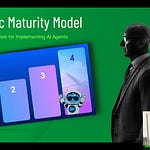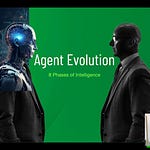In his book Only the Paranoid Survive, Intel CEO Andrew Grove coined the term Strategic Inflection Point (SIP)—a moment when the rate of change is ten times faster than what a business is used to. It's in these moments, Grove warned, that companies must either adapt or face decline.
1. Transformer (2018)
Description: Google’s Transformer architecture kicked off the modern AI era by introducing a new way for machines to understand language through self-attention mechanisms.
Impact: Powered the leap in natural language understanding, enabling more effective customer service bots, document summarization, and personalized marketing at scale.
2. ChatGPT (2022)
Description: OpenAI’s ChatGPT brought conversational AI to the mainstream, showing the world how generative models could engage users in human-like dialogue.
Impact: Transformed customer interaction, sales enablement, and employee productivity through AI-powered chatbots, writing assistants, and internal knowledge tools.
3. Reasoning (2024)
Description: AI models began demonstrating the ability to reason — solving logic-based tasks, following chains of thought, and providing more accurate answers.
Impact: Sales and strategy teams gained access to AI that could analyze tradeoffs, evaluate market scenarios, and assist in complex decision-making.
4. Model Context Protocol (MCP) (2024)
Description: MCP is an open protocol that standardizes how AI models can, in a secure and structured way, access external tools, data sources, and APIs.
Impact: MCP makes it easy for AI models to securely plug into your existing tools (CRMs, ERPs, analytics platforms) without needing custom code for every connection. Think of a USB for all things! This means faster deployment, lower IT overhead, and smoother workflows.
5. DeepSeek (2025)
Description: A new entrant into the LLM space that could retrieve and synthesize data from expansive knowledge sources without a large chip count (i.e., NVidia processors).
B2B Impact: DeepSeek slashed the cost of using large language models by up to 92%. This made advanced AI tools financially accessible to mid-sized companies, not just tech giants.
6. Agentic - A2A (2025)
Description: Google's new protocol allows AI agents to work with other agents — coordinating tasks, dividing labor, and completing goals through autonomous negotiation and delegation.
B2B Impact: Creating AI-powered teams that handle everything from lead generation to contract processing, freeing up human teams for high-value strategic work. We are just at the beginning of what this really means!
7. Multi-Reasoning AGI (2030 – projected)
Description: AI continues to exceed human benchmarks across different domains of learning. See the image below from Stanford University's 2025 AI Index Report.
B2B Impact: Will signal the arrival of AI as an executive-level thinking partner — capable of ideation, innovation, and solving problems across the entire business. Think of Sam Altman's 5th level of AI evolution: The 'Organization' Level.











